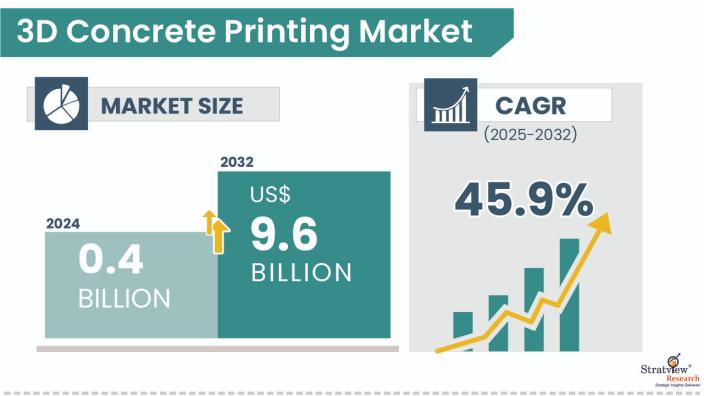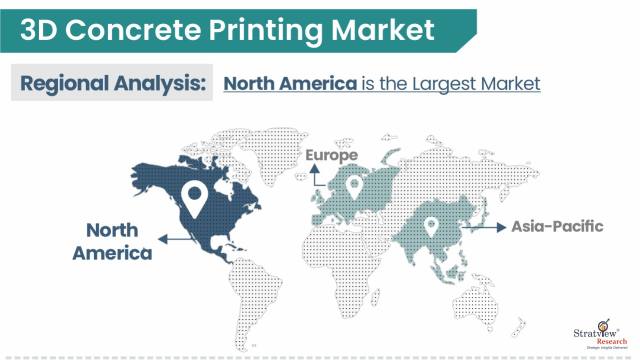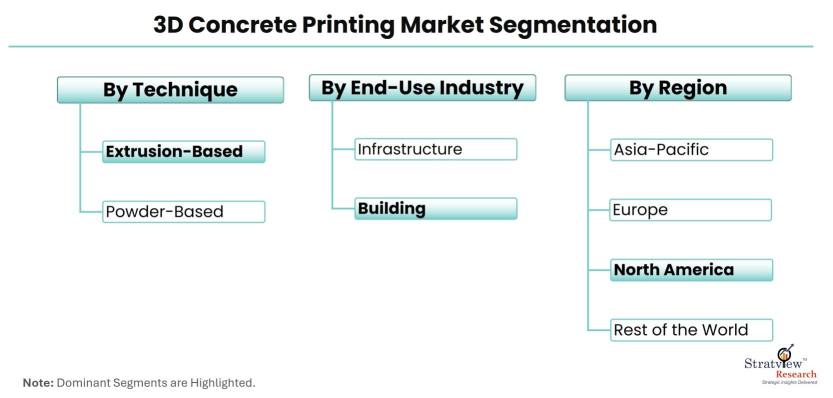Market Insights
The 3D concrete printing market was estimated at USD 0.4 billion in 2024 and is likely to grow at a CAGR of 45.9% during 2025-2032 to reach USD 9.6 billion in 2032.

Wish to get a free sample? Register Here
Market Dynamics
Introduction
3D concrete printing is used to manufacture building or construction components in completely new shapes, which is not possible in earlier conventional concrete formwork. It offers benefits such as manufacturing new customized and complex structures, digitalizing the process in order to streamline construction and minimize material waste, increased productivity, time savings, and lower construction costs.
Market Drivers
Sustainability and Cost-Efficiency Focus: The shift toward greener construction practices and budget-conscious development is increasing demand for 3D concrete printing. This technology enables precise material usage and reduced waste, aligning with sustainability goals and tightening project margins. Developers and contractors are attracted by its ability to minimize labor and resource requirements, while delivering on cost-effective and eco-friendly building solutions. As construction complexity grows, 3D printing’s ability to streamline processes with fewer materials and lower operational overhead becomes a significant market driver. This blend of environmental responsibility and financial efficiency is helping propel adoption in both public and private sectors.
Technological Innovation and Automation: Advances in hardware, software, and robotics are accelerating the 3D concrete printing market’s expansion. Improvements in printer design, sensor integration, and automated material control enhance precision and reliability. Continuous development of printing algorithms, structural modeling tools, and real-time monitoring systems empowers construction teams to execute complex, custom-built structures with minimal human oversight. Automation reduces errors, standardizes quality, and enables faster project timelines. As the technology matures, stakeholders gain confidence in its industrial-scale viability. Ongoing innovation across platforms and technologies is crucial to unlocking broader implementation and scalability, making automation a central growth catalyst.
Key Players
Some of the major players in the market are:
Note: The above list does not necessarily include all the top players in the market.
Are you the leading player in this market? We would love to include your name. Write to us at sales@stratviewresearch.com
Segment Analysis
|
Segmentations
|
List of Sub-Segments
|
Segments with High Growth Opportunity
|
|
Technique Type Analysis
|
Extrusion-Based, Powder-Based
|
Extrusion-based technique dominated the market in 2024 and is expected to remain dominant during the forecast period.
|
|
End-Use Industry Type Analysis
|
Building, Infrastructure
|
The Building Sector dominated the market in 2024 and is expected to grow at a higher CAGR during the forecast period.
|
|
Regional Analysis
|
North America, Europe, Asia-Pacific, and Rest of the World
|
North America dominates the 3D concrete printing market.
|
By Technique Type
The 3D concrete printing market is segmented as extrusion-based and powder-based. Extrusion-based techniques dominated the market in 2024 and are expected to remain dominant during the forecast period. This segment is driving the market due to its capability to produce complex building structures at a larger scale. It also has the ability to produce structures with conventional construction materials.
By End-Use Industry Type
The market is segmented as building and infrastructure. The Building Sector dominated the market in 2024 and is expected to grow at a higher CAGR during the forecast period. Increasing adoption of 3D printing in the building industry due to its ability to create lightweight structures while maintaining its structural integrity and to build complex structures with ease at an affordable rate is driving the market.
Regional Insights
North America dominates the 3D concrete printing market due to its strong focus on innovation, early adoption of advanced construction technologies, and increasing demand for sustainable and cost-efficient building solutions. The region benefits from a well-developed construction sector, significant investment in R&D, and a supportive regulatory environment encouraging the use of automation and eco-friendly practices. Government initiatives and private sector interest in addressing housing shortages and infrastructure development have accelerated the use of 3D concrete printing. Additionally, collaborations between technology providers and construction companies are driving practical implementation, making North America a global leader in this emerging market.

Know the high-growth countries in this report. Register Here
Research Methodology
This strategic assessment report, from Stratview Research, provides a comprehensive analysis that reflects today’s 3D concrete printing market realities and future market possibilities for the forecast period of 2025 to 2032. After a continuous interest in our 3D concrete printing market report from the industry stakeholders, we have tried to further accentuate our research scope to the 3D concrete printing market to provide the most crystal-clear picture of the market. The report segments and analyses the market in the most detailed manner to provide a panoramic view of the market. The vital data/information provided in the report can play a crucial role for the market participants as well as investors in the identification of the low-hanging fruits available in the market as well as to formulate the growth strategies to expedite their growth process.
This report offers high-quality insights and is the outcome of a detailed research methodology comprising extensive secondary research, rigorous primary interviews with industry stakeholders, and validation and triangulation with Stratview Research’s internal database and statistical tools. More than 1000 authenticated secondary sources, such as company annual reports, fact books, press releases, journals, investor presentations, white papers, patents, and articles, have been leveraged to gather the data. We conducted more than 15 detailed primary interviews with the market players across the value chain in all four regions and industry experts to obtain both qualitative and quantitative insights.
Report Features
This report provides market intelligence in the most comprehensive way. The report structure has been kept such that it offers maximum business value. It provides critical insights into market dynamics and will enable strategic decision-making for existing market players as well as those willing to enter the market. The following are the key features of the report:
- Market structure: Overview, industry life cycle analysis, supply chain analysis.
- Market environment analysis: Growth drivers and constraints, Porter’s five forces analysis, SWOT analysis.
- Market trend and forecast analysis.
- Market segment trend and forecast.
- Competitive landscape and dynamics: Market share, Service portfolio, New Product Launches, etc.
- COVID-19 impact and its recovery curve
- Attractive market segments and associated growth opportunities.
- Emerging trends.
- Strategic growth opportunities for the existing and new players.
- Key success factors.
Market Segmentation
This report studies the market, covering a period of 12 years of trend and forecast. The report provides detailed insights into the market dynamics to enable informed business decision-making and growth strategy formulation based on the opportunities present in the market.
The 3D concrete printing market is segmented into the following categories:
By Offering Type
- Materials
- Printing Services
By Technique Type
- Extrusion-Based
- Powder-Based
By End-Use Industry Type
By Region
- North America (Country Analysis: the USA, Canada, and Mexico)
- Europe (Country Analysis: Germany, France, the UK, Russia, Spain, and Rest of Europe)
- Asia-Pacific (Country Analysis: China, Japan, India, South Korea, and Rest of Asia-Pacific)
- Rest of the World (Sub-Region Analysis: Latin America, the Middle East, and Others)

Click here to learn the market segmentation details.
Report Customization Options
Stratview Research offers one of the following free customization options to our respectable clients:
Company Profiling
- Detailed profiling of additional market players (up to 3 players)
- SWOT analysis of key players (up to 3 players)
Competitive Benchmarking
- Benchmarking of key players on the following parameters: Product portfolio, geographical reach, regional presence, and strategic alliances.
Custom Research:
Stratview Research offers custom research services across sectors. In case of any custom research requirement related to market assessment, competitive benchmarking, sourcing and procurement, target screening, and others, please send your inquiry to sales@stratviewresearch.com.

